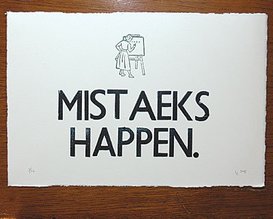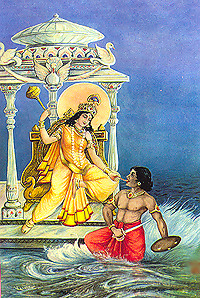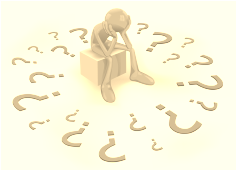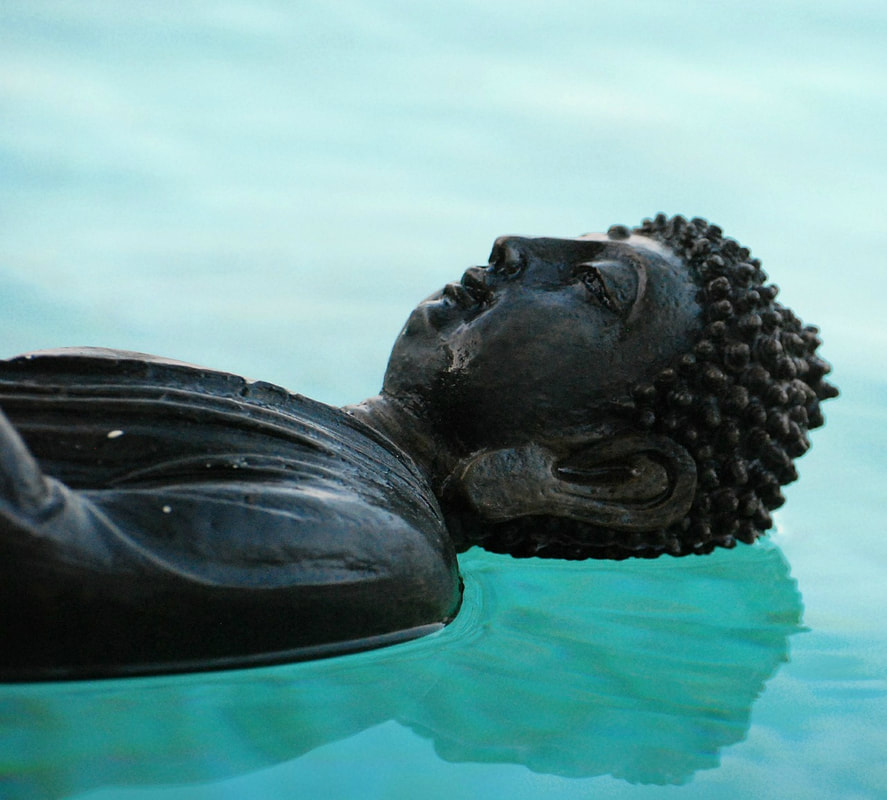 A woman I went to yoga teacher training with posted a happy birthday shout-out to her twin girls on Facebook this morning. She wrote how she had gotten pregnant when she was too young and that her pregnancy was touted as a mistake. And then came the sentence I fell in love with..." It's no wonder that I hold mistakes in such high regard, our most effective tool towards growth." It made me wonder why the word mistake conjures up bad connotations. The dictionary defines mistake as " an error in action, calculation, opinion, or judgment". I may have incorrectly used a word, wrote down the wrong date or failed in a calculation none of which are bad (or good, for that matter) ...they just are. As such, mistakes have consequences we did not purposely acquire. If there is purpose, it is not a mistake, is it? So, if it is not on purpose, how are we or our "mistakes" deemed anything but lessons of life? There is so much judgment out there. I recently read a news story about a little boy who saw his father's gun sitting on the table and as he picked it up the gun went off shooting his dad in the back. His dad died. Do you judge the boy for a death? The boy was neither good nor bad in this situation; he had no ill intent. It was a mistake. A sad horrible one, but a mistake. Do you judge the father for putting the boy in this situation by leaving his gun out? Does that even matter now? The man is dead and the boy will suffer this incident in his head and heart for the rest of his life. Maybe what mistakes are here to teach us is compassion. I hope as that boy grows up someone teaches him to embrace his own self with compassion. What if we all decided today to hold our mistakes in high regard? Note it is not the outcome we hold in high regard; it is the lesson. In that previous story, what we should hold in high regard with awe is the delicacy of life. What if we understood other people's mistakes to be similarly constructed to our own? Would we judge so harshly? I am just not certain of the word "mistake". When Andrea wrote, "It's no wonder that I hold mistakes in such high regard", she was referring to two beautiful human beings that she created and is madly in love with. She was offering her readers, whether consciously or not, a lesson in judgment, a lesson in love and a lesson in life. Perhaps Luis Miguel sums up the word as accurately as anyone else...“I think we all wish we could erase some dark times in our lives. But all of life's experiences, bad and good, make you who you are. Erasing any of life's experiences would be a great mistake.”
0 Comments
 Dressed all in yellow, Goddess Bagalamukhi sits on a golden throne surrounded by yellow lotuses. But don't let that pretty image fool you. She is one of the ten wisdom goddesses and she is usually depicted grasping the tongue of a demon and using her club to nail the tongue down. She is also sometimes seen sitting on a corpse... a male corpse. Do not lie to her; she is the goddess of supreme speech. She teaches that with wisdom of speech we can virtually paralyze our enemies. But what does she have to teach if your own enemy is, well, you? Remember that the Yoga Sutras explain that we create our own suffering in the re-telling of stories in our head. We all have memories attached to regret or remorse or sadness. Often times, we replay those stories starting each sentence with "what if". "What if" I had done this instead? "What if" I had been more understanding? What if??? Bagalamuhki, when not wielding a club, offers blessings with that hand while holding onto the liar's tongue with her other. The ego, in helping us re-tell these stories, is the liar. She prompts us to stomp on that deceiving voice and to restore the truthful stories in our head. What if you are saying but my story is a truthful story in my head! If I had made a different choice, what ensued would never have happened? I would have to respond with do you choose to live in your own suffering? The past cannot be changed and the present, however we got here, is what is. Take a deep breath and choose to let it go. The Sanskrit word Bagalamukhi has a few translations. Bagala means bridle and mukhi means face. Picture a bridle on a horse. The bridle is attached to the bit; the metal piece that goes in the horse's mouth and rests on his tongue. The bit serves to control the horse's movements. This is a good image to dwell upon when untruths are about to spill out of your mouth, whether directed towards you or someone else. Another translation of her name is "the crane-headed goddess". "There is a Japanese idiom that translates into, “one word from the crane’, meaning the “voice of authority”, the one who has the final word that isn’t challenged." (Jenny Nakao Hones) Bagalamukhi is a force to be reckoned with as is what she doles out to those who are not truthful. A crane has a very long neck and another aspect of symbolism to her name may just be in the distance between the heart and head. While our mind may reconcile a memory, our heart seems to take a bit longer. But does this leave us paralyzed in our past until the heart center catches up? Bagalamukhi is also referred to as “the paralyzer.” When she nails down the tongues of those who are deceitful they are said to become paralyzed or at least their words are. They certainly aren't free in movement anymore! Goddess Bagalamukhi denotes duality; having two parts with opposite meaning. Evil speech is rewarded by her with silence. Those who follow her find their defeats become victories. Her duality can work in both directions, positive and negative. Each deity has mythology attached to him or her explaining their own creation. As legend has it, there was once a tremendous storm on earth and the Gods were fearful it would destroy everything and everyone. The Gods held a meeting to discuss how to weaken the raging storm. Goddess Bagalamukhi appeared and she is the one who manages to calm the storm. So, when the ego stories kick in and begin to torment your thoughts, heart and mind, dig deep, stand tall and use your own powers to calm the storm.  The Corner of Hollywood and Vine by John Mundahl I met a saint once, downtown L.A., In a small auditorium where she was giving a talk. I don’t remember what she said, Just her eyes as I gave her a flower. They came from a place foreign to me, Great peace amid a noisy world. She took my flower and smiled, And I knew for one moment That I was everything to her, That I was all she saw, And a tiny candle Long buried And forgotten Deep within My frozen Heart, Lit. And I knew that I had worth Just the way I was. Later that night, when I left the auditorium, I hugged the first beggar I saw On the corner of Hollywood and Vine And I went home happy. I can still see his confused face. Merriam-Webster defines confusion as "a state of mental uncertainty". Speaking of confusion...someone posted a Facebook video where a camera was set up and various couples were asked who would they most want to have dinner with if they could. Some responses were Justin Bieber, Nelson Mandela, and various actors and actresses. Then their kids were set before the camera and asked the same question. They all either said family or mom and dad. When the parents watched their kids' answers, they looked confused, then happy, then with disbelief they hadn't said the same thing. Michael J. Gelb writes, “Confusion is the welcome mat at the door of creativity.” Just try not to be confused about what really matters.  Ever thought you had heard it all and then someone says something and you reassess, "Well, now I've heard it all!"? I am a Reiki Master Teacher and another RMT, whom I had never met before, told me she was going to stop teaching reiki because she felt there were too many reiki practitioners in the world. Seriously, what? That's like saying there are too many people offering peace, too many people sending prayers, too many people showing kindness. I just don't get it. So, today, our theme in class was one of the Shanti Mantras, otherwise translated as Peace Mantras. These mantras are found in the Vedas, which are ancient bodies of Sanskrit texts. They are often chanted at the beginning of ceremonies or before certain topics in the Upanishads. They are recognized as calming to the chanter and the space around him/her. Shanti Mantras always end in reciting the word Shanti three times. Shanti means peace and the reason for saying it three times is to bring peace to the physical, divine and internal elements where Hindu scriptures say all our obstacles can be found. " Physical =external world, such as from wild animals, people, natural calamities etc. Divine = extra-sensory world of spirits, ghosts, deities, demigods/angels etc. Internal= one's own body and mind, such as pain, diseases, laziness, absent-mindedness etc." One of the Shanti Mantras: Om sarveshaam swastir bhavatu Sarveshaam shantir bhavatu Sarveshaam poornam bhavatu Sarveshaam mangalam bhavatu Sarve bhavantu sukhinah Sarve santu niraamayaah (niramayah) Sarve bhadraani pashyantu Maakaschit duhkha bhaag bhavet (makasheet dukah bhag bhavate) Meaning: Auspiciousness (swasti) be unto all; peace (shanti) be unto all; fullness (poornam) be unto all; prosperity (mangalam) be unto all. May all be happy! (sukhinah) May all be free from disabilities! (niraamayaah) May all look (pashyantu)to the good of others! May none suffer from sorrow! (duhkha) The poet T. S. Eliot, in his poem The Waste Land (where he spelled it Shantih) translated it as "The Peace which passeth understanding": MEANING :May peace radiate there in the whole sky as well as in the vast ethereal space everywhere. May peace reign all over this earth, in water and in all herbs, trees and creepers. May peace flow over the whole universe. May peace be in the Supreme Being Brahman. And may there always exist in all peace and peace alone. Aum peace, peace and peace to us and all beings! Aum shanti, shanti, shanti.  “Reyes. Alexander. Farrow," I said. Seconds after I spoke his name, Reyes walked into his bedroom, and I looked across the open space directly from my room into his. He waited for me to continue. "I feel like there's something missing from my bedroom." A dimple appeared at the corner of his mouth. "You don't say." "Any idea what that might be?" He glanced around my room as well, then shrugged. "I can't imagine." "Oh, wait," I said, stepping from my room into his, "wasn't there something here? Like, I don't know, a wall or something?" He looked up. "You could be right. I do seem to remember a barrier of some kind here." "Yep," I said, stepping closer, "I definitely remember a partition separating our apartments." When his only response was a mischievous tilt of his full mouth, I asked, "Where did you put my wall?" He crossed his arms over his chest and leaned against his doorframe. "What makes you think I took it?" "It was there this morning." "And that means I took it? Maybe you just misplaced it. Where exactly did you see it last?" I pressed my lips together. "You tore down my wall." The smile he wore could've charmed the panties off a nun. Completely unrepentant, he admitted, "I tore down your wall.” ― Darynda Jones, Sixth Grave on the Edge When we put up walls it is very stifling for our energy. Imagine boxing in your heart chakra so it doesn't have to feel again or your throat chakra so you can partition off communication. Trump wants to build walls but he wants someone else to pay for them. When we put up walls, we are the ones who pay. I came across two quotes about wall building; thank goodness they are both from unknown authors because I would be sure never to quote those writers again. They read: "Sometimes putting up walls isn't a bad thing. Not to keep people out, but to see who cares enough to break them down." Unknown "Suddenly this is all too hard, I am tired of putting up walls I want someone with the strength and the honesty to break them down." Unknown Seriously? The one who comes along with strength and honesty is supposed to be you. And you are supposed to be the one who cares the most about taking your walls down...you put them up!!! These quotes merely offer excuses in a way that sounds authentic and official because they are "quotes". Why do we put these walls up in the first place? I think the main reason is as a defense mechanism...we think this will protect us. But in even digesting that statement, it infers we have an ounce of control over other people. Control is illusory and if you are a self-identifying control addict, I am guessing your third chakra is expressing imbalances in a way you have not noticed, because you are too busy trying to control everything! Walls eventually crumble. And when defense mechanism walls fall to pieces, we begin to feel and become aware of all those emotions we have been blocking out. Sand castles are harder to put up than take down; emotional walls work in the opposite way. And you, only you, can elicit the strength needed to remove them. Even in the book excerpt above, the man was persistent in sticking around and tearing down the "bedroom wall" but it was the woman, herself, the wall-builder, who had to let go and be okay with that. John Coleman's definition of meditation is one of the best I stumbled across yet. In his article "Meditation & Mitigating Parkinson's Symptoms" (theparkinsonhub.com) he writes, "In my view, meditation is a time of day we deliberately set aside to create a feeling of peace and joy on a regular basis."
I love that this definition frees our meditation from a specific amount of time, a specific place and a specific seated position. This definition simply allows us to experience our meditation experience as it unfolds before us. Meditation does not have to be seated stringently in a lotus position without movement. That isn't realistic or feasible for many people. Below are various meditation techniques for you to try out so you can find one or two different ways that work for you. TYPES OF MEDITATION Focus/Concentration Object: Candle flames, cleansing water, the buttons on your remote control! Mantra: Choose a word- love, harmony, peace, health, soham (I am that) Thought: koan- a question without an answer Journaling- unedited let-it-all-go type of writing Breath- Count inhales/exhales, watch breath, feel breath Sound- Music, chanting Moving- walking, coloring, washing dishes Guided Meditation- search youtube for a variety Sound (music, accessible to all), chanting 1. love and light; om namah shivaya Moving- walking, coloring, dishes, tense muscles then let go, slow movement To Meditate by Thich Nhat Hahn To meditate does not mean to fight with a problem. To meditate means to observe. Your smile proves it. It proves that you are being gentle with yourself, that the sun of awareness is shining in you, that you have control of your situation. You are yourself, and you have acquired some peace. |
Archives
March 2024
|

 RSS Feed
RSS Feed